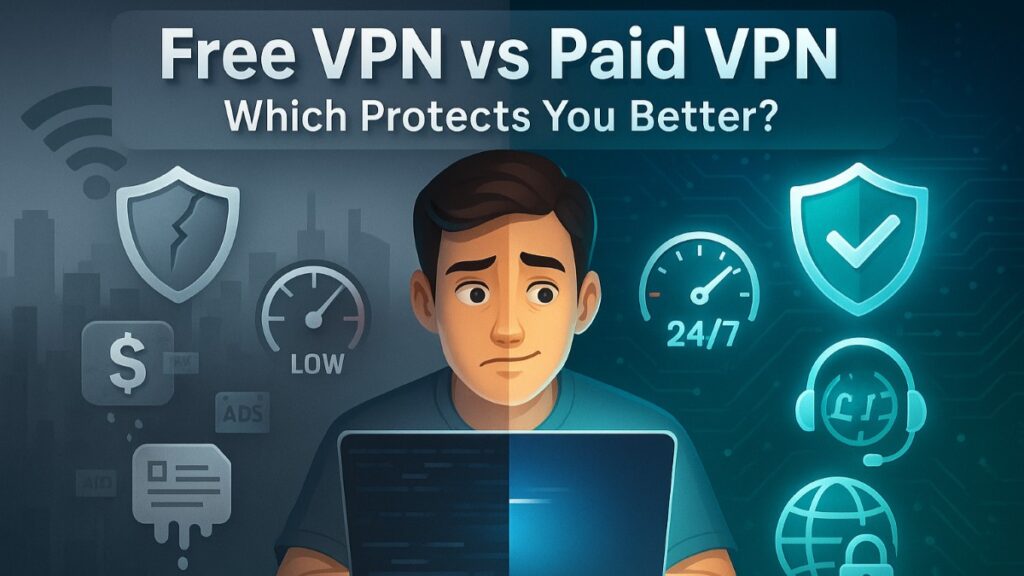Wondering whether to choose a free or paid VPN in 2025? Discover the key differences in privacy, security, speed, and value to make the right choice for your online safety.
VPNs have evolved from niche privacy tools for tech enthusiasts into essential digital security solutions. Today, they’re used by millions worldwide to ensure online freedom, anonymity, and cybersecurity.
In modern work environments, VPNs play two crucial roles — they enable remote work by securely connecting users to company systems and protect confidential data with strong encryption. VPNs also allow users to bypass geographical restrictions and access content freely, making them indispensable for both personal and professional use.
As VPN use grows, one question dominates: Free VPN vs Paid VPN — which is better for privacy, speed, and value?
This article explores the key differences, pros, and cons of each option to help you make the right decision.
Are Free VPNs Effective?
Free VPNs are appealing because they provide basic privacy protection without any financial cost. For users who want to test VPN technology before committing to a paid plan, free VPNs offer an easy entry point.
However, the old saying applies: “If something is free, you’re the product.”
Many free VPNs compromise user data by collecting browsing information, selling it to advertisers, or inserting targeted ads. Their encryption is often weaker, making them more vulnerable to security breaches.
So while free VPNs may help you hide your IP address or bypass minor restrictions, they often fail to deliver true privacy or reliable performance.
Advantages of Paid VPNs
Paid VPNs provide advanced encryption, faster servers, and enhanced privacy features. With stronger connections and better infrastructure, they offer a safer and smoother online experience.
Key benefits include:
- Top-tier encryption: Most premium VPNs use AES-256 encryption, the same standard used by banks and government institutions.
- Zero-logs policy: Paid VPNs usually guarantee that your online activity isn’t recorded or sold.
- Global servers: Access to hundreds or even thousands of servers worldwide ensures high speed and stable connections.
- Advanced features: Many paid VPNs include kill switches, multi-hop routing, and DNS leak protection.
This combination of security, reliability, and transparency makes paid VPNs a far more trustworthy choice.

Are Paid VPNs Worth Your Money?
Yes — if you value your privacy, security, and speed.
Paid VPNs are especially useful for users handling sensitive data, working remotely, or frequently accessing public Wi-Fi networks.
Most premium VPNs offer free trials or money-back guarantees, allowing you to test features like split tunneling, different protocols (OpenVPN, WireGuard, IKEv2), and streaming capabilities before subscribing.
As cyber threats become more advanced, investing in a reputable VPN — such as NordVPN, ExpressVPN, or ProtonVPN — ensures your privacy isn’t compromised.
Benefits of Free VPNs
Despite their flaws, free VPNs can still be useful in certain cases:
- No Cost
Perfect for users who want to explore VPN functionality without spending money. - Basic Safety
Some free VPNs encrypt your connection and hide your IP address, offering minimal protection when using public Wi-Fi.
Drawbacks of Free VPNs
- Limited Features and Performance
Fewer servers, slower speeds, and bandwidth caps make them unsuitable for streaming, gaming, or large file transfers. - Security and Privacy Risks
Many free VPNs log user data or inject ads, completely undermining the purpose of using a VPN. - Poor or No Customer Support
Free VPN providers rarely offer reliable technical assistance when you encounter issues.
These limitations make free VPNs a temporary or backup solution, not a long-term privacy tool.
Benefits of Paid VPNs
- Enhanced Performance
With high-speed global servers and unlimited bandwidth, paid VPNs deliver consistent performance even under heavy use. - Stronger Security Features
Premium VPNs offer kill switches, multi-layer encryption, and protection against DNS/IP leaks. - No Data Logging
Trusted VPNs are audited by third parties to confirm that they don’t store or sell user data. - 24/7 Customer Support
Paid VPN services provide live chat, email support, and detailed guides to help you troubleshoot issues quickly.
Industry experts like Robertas Višinskis, Founder of Mysterium VPN, emphasize that investing in a premium VPN isn’t just about speed — it’s about ensuring that your privacy isn’t for sale.
Drawbacks of Paid VPNs
- Subscription Cost
Premium VPNs come with a recurring fee, which might add up over time — though many offer discounts on annual plans. - Overpricing Concerns
Some VPNs may charge more than necessary or exaggerate their features. Always research and choose a reputable provider with verified reviews.
Free VPN vs Paid VPN: Final Verdict
Your choice depends on your needs and priorities.
- Choose a Free VPN if you only need temporary or light protection for basic browsing.
- Choose a Paid VPN if you value speed, privacy, security, and long-term reliability.
In 2025, as data breaches and online surveillance rise, investing in a trusted paid VPN is the safest path to complete digital privacy and peace of mind.


